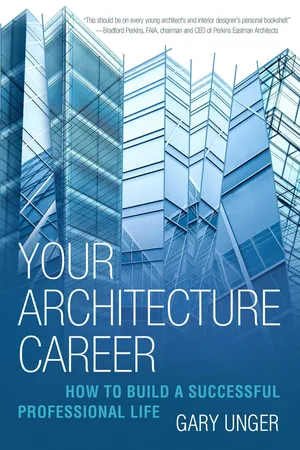![]()
PART I
Finishing School and Getting a Job
![]()
CHAPTER 1
Completing Architecture School
WHAT TO FOCUS ON DURING YOUR LAST TWO YEARS
Most course curricula become very specific in the last two years of an architectural or interior design program—without a lot of room for electives. Here are three things I encourage all students to focus on during their years in school:
Additional Elective Courses
Despite the rigors of the required design/thesis lab courses, I recommend taking as many professional practice or business administration courses as you can fit in. This will be your last and probably only time to be exposed to the foundation of the business of architecture. Not all of you will become primary designers in the firm you choose to work for, so having more than a basic understanding of the specifics of the business will be useful. For example, it is necessary to learn all you can about finance, marketing concepts, proposal writing, presentation techniques, time management, and project management.
Courses on Creative Writing
Architects need to write more than they think they will. It is imperative that architects take as many courses on creative writing as they can fit into their schedule. If there is a course on email writing, I encourage you to take it because the state of email communication in business today is pathetic. It is one thing if you are writing an email to a friend asking to get together for lunch and it is not worded properly, but it is another when you send a client an email about a schedule slippage, budget overrun, or other detail. Emails should be written like letters with a beginning, middle, and end. Most important of all, do not forget emails are legal documents.
Creating a Contact “Job Search” Database
Start while you are in school to create a contact list of professors, students, school administration staff, visiting professors, potential companies you may send résumés to, vendors, and speakers.
One of the most important tasks you will learn in Part 1 is how to get organized for an effective job search.
The list will be valuable to you in school and for many years to come as you begin your professional career.
My recommendation is to keep your job search references and information separate from your personal phone contact list.
There are many templates available for tracking this information using Excel or Google Docs. There are also free and inexpensive database apps that will keep you organized.
Important information to track
• Contact Name
• Title
• Business Affiliation
• Business Phone
• Cell Phone
• Email
• Type of Contact
• Company Name
• Additional Contact
• Address
• Main Phone #
• Website
• Date Résumé Submitted
• How Résumé Submitted
• What Was Submitted
• Letter
• Résumé
• References
• Follow-Up Date
• Result
• Job Description
• Personal Notes
• Interview Notes
IMPRESSING YOUR PROFESSORS SO THEY WILL REMEMBER AND RECOMMEND YOU
Many of the professors at Washington University School of Architecture, which I attended, were very successful architects in their home countries. It was fashionable for schools during the ’60s to use visiting professors. Many had both professional and personal reasons for coming, beyond their contracted teaching assignments. Teaching was a way for them to take a year and travel through the United States. Many also had special design projects they needed to complete, or were doing research for future books, so having access to loads of students they did not have to pay was very positive. This was both a plus and a minus to me. The plus was that I was able to help them with those tasks, and it was a great way to learn about real projects. The minus was that they were super busy and did not have extra time to meet for discussion and advice beyond the assigned lab period. If you find yourself in this position, volunteer in order to get an opportunity to develop the relationship and hopefully a recommendation.
Professors are excellent references once they know your capabilities. In order to make that happen, go out of your way to volunteer to help and chat with them about their firms. Take the time to look them up online so you can better understand their practice. Without being too pushy, ask for their advice and support.
NETWORKING WITH CLASSMATES, ALUMNI, AND PROFESSORS
Coordinate your job search research with classmates and share information with one another about firms in various cities. When you start looking for your first job, there is a lot of information to gather, and the “divide and conquer” approach makes a lot of sense, especially with the more mundane tasks of gathering contact information about firms in each city.
By the middle of your next-to-last year, you need to be making contacts for summer jobs. Your professors should be able to be a big help to you in the search. If you have a placement office or guidance office, sometimes they get calls from local firms or associations like the AIA and ASID and know who is looking for summer interns. I have always considered alumni to be the best resource because there should be an immediate bond with them and, hopefully, willingness to help. At least a good letter should get you in the door for an interview with one or more of the alumni from your school.
![]()
CHAPTER 2
Deciding on a Career Path
A SUMMER INTERNSHIP BEFORE YOUR LAST YEAR
The summer of your next-to-last year in architecture school is one of the most important for your future career as an architect. If you are able to land a summer internship, it will significantly enhance your ability to find a job after graduation. Employers reviewing résumés for a full-time job like to know that you have had some related work experience. I recommend starting to look for that summer job in February or March. Use your connections to help you find out about potential summer jobs. You need to learn how to leverage your relationships with:
• Professors, school counselors, and alumni coordinators
• Family friends and students
• Architectural alumni
• Local AIA contacts—get to know the staff in local AIA offices
I am not big on following or responding to job boards, want ads, or online recruiters. In my experience, summer jobs are rarely listed that way. You need to be looking for the job that is not posted. It is to your advantage that summertime is the biggest period for employee vacations. In many cases, your job may be filling in for employees who are on vacation. Your cover letter or email should trigger ideas in the mind of the reader that it would be a good idea to have you f...


